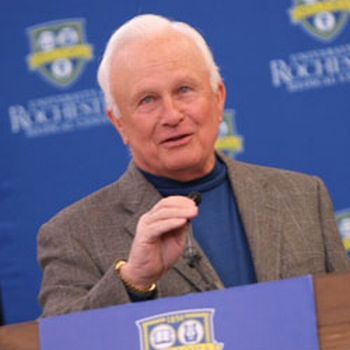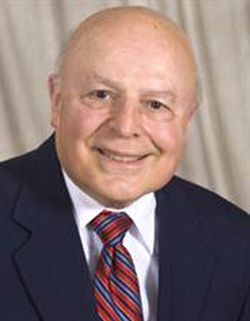$10 Million Gift from Philip Saunders Advances URMC’s Neuromuscular Program
$10 Million Gift from Philip Saunders Advances URMC’s Neuromuscular Program, Other InitiativesJune 3rd Golf Classic to Benefit Women’s Health

- E. Philip Saunders
Philip Saunders, a Rochester businessman and a major supporter of the neuromuscular disease program at the University of Rochester Medical Center, has donated an additional $10 million – one of the largest gifts ever in the history of the Medical Center – for the program as well as other URMC research initiatives.
The gift boosts dramatically one of the signature programs of the Medical Center – neuromedicine, an area in which its scientists and physicians excel in both patient care and research.
Some of the funds will be used to support cancer research, particularly URMC’s proposed research collaboration with Roswell Park Cancer Institute in Buffalo. Saunders’ support also boosts the University’s commitment to clinical and translational science, accelerating the development of new treatments for many diseases based on discoveries in University of Rochester laboratories.
“Diseases of the brain and nervous system are among the most common – and most devastating – conditions known,” said Bradford Berk, M.D., Ph.D., Medical Center CEO. “Fortunately, the University of Rochester is amazingly strong both in treating these conditions and performing research in these areas. The need for cures and treatments is great – and we have the knowledge and expertise to create those cures and treatments. This gift from Phil Saunders ensures that Rochester will remain on the forefront of outstanding patient care and research for years to come.”
“This tremendously generous gift by Phil Saunders strengthens the University of Rochester’s stellar reputation as an international leader in neuromedicine and ensures that our patients will continue to receive care that is among the best anywhere on the planet. The gift of these hard-earned funds makes it possible for our researchers to maintain a vigorous pace in their search for new treatments and to remain a beacon of hope for patients from around the globe,” said Joel Seligman, president of the University of Rochester.
Saunders previously has given more than $1 million to the Medical Center, largely to support groundbreaking research in the Neuromuscular Disease Center. Those funds have been instrumental in helping University neurologists make several promising discoveries about myotonic muscular dystrophy, the most common type of muscular dystrophy affecting adults.
That gift also enabled Medical Center physicians and scientists to attract an additional $22 million in research funding – creating jobs, boosting the Neuromuscular Disease Center’s reputation internationally, and perhaps someday making possible a new treatment for a devastating disease.
“The University of Rochester Medical Center is not just a great hospital,” said Saunders. “It’s a major academic medical center with a huge research component, seeking cures for disease, attracting dollars far beyond Rochester and bringing those funds to Rochester, building an economic base, attracting new ideas and businesses, and providing jobs for many people. Those are the types of activities I like to support.”

Richard Moxley, M.D.
Saunders noted that his family has long had ties with the Medical Center. More than two decades ago, one of Saunders’ children was critically ill and was treated in the intensive care unit by Richard Moxley, M.D., a neurologist and director of the Neuromuscular Disease Center. A friendship between Moxley and the Saunders family developed that remains to this day.
The bulk of the gift will go toward supporting outstanding clinical care and research in neuromuscular disease. The donation is designed to create two endowed professorships that will support outstanding clinicians and researchers. The funds will also create an endowed fellowship in neuromuscular disease, designed to help the University attract the nation’s best developing neuromuscular researchers.
According to Moxley, the gift from the Saunders family fills a crucial need in making URMC a particular fertile ground for continued innovation.
“People are our biggest strength and our most critical need,” said Moxley. “This gift from Phil Saunders ensures that our people have the freedom and the flexibility to pursue multiple promising projects simultaneously as we seek better treatments for conditions like muscular dystrophy. This is a great gift at a time when the opportunity to really understand and make great strides against the disease is really developing.”
Saunders is dedicating the gift to veterans of the U.S. armed forces.
“I am so proud of the men and women who serve our country to preserve our freedom,” said Saunders. “They should never be forgotten.”
The University’s neuromedicine program has long been ranked as one of the top-funded research programs in the nation. At the Medical Center, research into diseases of the brain and central nervous system account for nearly one-third of all research dollars and activity. Neuromedicine research pervades more than two dozen academic departments throughout the Medical Center and River Campus.
At the same time, Strong Memorial Hospital and URMC-affiliated Highland Hospital represent highly coveted training grounds for young physicians. This fall Highland Hospital will open a new 22-bed inpatient Neuromedicine Unit devoted to patients with such conditions as stroke, head injuries, and brain tumors.
In addition to neuromuscular diseases like muscular dystrophy and Lou Gehrig’s disease, the Medical Center’s neuromedicine program focuses on a range of conditions that affect nearly every family. More than 10 million Americans are coping with the effects of conditions like Alzheimer’s and Parkinson’s diseases, stroke, traumatic brain injury, and spinal cord injury.
Several striking examples of translational research – laboratory discoveries applied to everyday patient care – have resulted from the work of physicians and scientists in the Medical Center’s neuromedicine program. In one notable development, an astute physician tuned in to the symptoms of one of his patients, empathized about her hot flashes, and paid attention when she reported a sudden change in her condition after taking a medication designed to treat her headaches. He investigated further, then went back to the laboratory and learned more about the biology of hot flashes. His findings have resulted in a potential new treatment for hot flashes that is now being tested in people.
In another example, Moxley himself recently conducted a study showing that a medication commonly used to treat cardiac arrhythmias also relieves the symptoms of myotonic dystrophy without side effects, leading to less pain and stiffness for many patients.
In both cases, it’s the combination of expertise – treating patients as individuals, coupled with doing research to improve the lives of similar patients around the globe – that is a hallmark of the Medical Center’s neuromedicine program.
“This is a particularly exciting time for patients with muscular dystrophy and for the physicians and nurses treating them,” added Steven Goldman, M.D., Ph.D., chair of the Department of Neurology. “Great strides have been made in recent years, right here by my colleagues at the University of Rochester, and the generous support of the Saunders family will allow that work to continue uninterrupted.”
The donation is the second $10 million gift to the Medical Center’s neuromedicine program in less than two years. In 2009, Ernie and Thelma Del Monte gave $10 million to create the Ernest J. Del Monte Neuromedicine Institute, a gift that has helped drive the University’s neuromedicine reputation as a nationally recognized, comprehensive center for investigating and treating conditions of the brain and nervous system.
* The above story is reprinted from materials provided by University of Rochester Medical Center



















